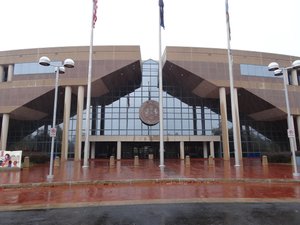
Arlington and Fairfax counties have established $1 million innovation funds this year, following in the footsteps of other local jurisdictions that have stood up funds of their own in recent years in an effort to retain promising startups, create more jobs and increase their tax bases.
The $1 million Arlington Innovation Fund was created last month and will award grants ranging from $25,000 to $50,000 to between 13 and 26 startups based in the county. The Fairfax Founders Fund, also seeded with $1 million, launched in March and is in the process of choosing its first cohort or startups from a pool of 40 applicants.
The funds are backed by different sources — Arlington's comes from a carve-out in the county budget, Fairfax's is from the county's Economic Opportunity Reserve Fund — but both have essentially the same goal: to provide funding to small, young companies that could eventually become bigger employers within their borders.
“We're experiencing a record high vacancy rate here in Arlington County,” said Michael Stiefvater, acting director of business investment for Arlington’s economic development department. “Our goal is to create and generate economic activity that will help us build companies here in Arlington, that will grow, that'll hire employees and eventually grow into office users.”
Rebecca Moudry, director of the Fairfax County Department of Economic Initiatives, said the program provides entrepreneurs with $50,000 grant “to help those businesses that may not have that initial access to capital, to help them scale up and also to help them grow in Fairfax County and to stay in Fairfax County.”
Prince William County has a similar fund, the 3-year-old Ignite grant, which awards grants of $25,000, $50,000 or $100,000, depending on the startup's stage of development. To be eligible, companies must be for-profit, have at least two employees and commit to remaining in the county for at least three years after receiving funding. Importantly, their founders must either reside in Prince William or outside of Northern Virginia, a stipulation the county included so as to not look as if it's poaching startups from neighboring jurisdictions, said Christina Winn, the executive director of the Prince William County Department of Economic Development.
“When you look at economic development goals and objectives for not only for Northern Virginia but D.C. and Maryland, it's really to grow our whole economy, our whole region," said Winn. "So just kind of playing the chessboard of moving startups from one community to the next, does not do anything to achieve that."
The Ignite grant was launched in 2020 using funds from the coronavirus relief bill Congress passed early in the pandemic but now leverages funds from the American Rescue Plan Act passed a year later. It initially was open to all small businesses but has since been revamped to focus on tech startups. It has awarded 12 grants so far — recipients have included virtual reality startup Vita Vita and biotech startup Bacchus Therapeutics — and the county is in the process of reviewing applications for its next round of grants.
In all of the programs, the grants are non-dilutive, require some type of matching investment from recipients — either in the form of capital or "sweat equity" — and stipulate that awardees remain in the jurisdictions for a specific period of time. In both Arlington and Fairfax, a recipient must repay a portion of the funding if it relocates to another jurisdiction within 24 months.
“We're putting our money where our mouth is," said Stiefvater.
D.C., like these surrounding Northern Virginia counties, has an innovation fund of its own. It is equity-focused and looks to give funds to underserved founders.
Melissa Bradley is the founder and managing partner of D.C.’s 1863 Ventures, which manages D.C.’s $2 million Inclusive Innovation Equity Impact Fund. The fund was established in 2021 and has awarded $1.25 million in grants to 16 small businesses. It's currently reviewing companies from its most recent round of applications that closed June 1.
Despite the Supreme Court’s decision against affirmative action in higher education and the lawsuit that scuttled the city of Alexandria’s small business grant program focused on Black, Indigenous and people of color, Bradley isn’t worried about the survival of D.C’s fund because it follows the letter of the law. The fund focuses on founders deemed “underserved and historically marginalized,” which is not in itself a racial identifier.
What worries Bradley is that more equity-focused funds could be challenged.
“I think the Supreme Court's decision can be read very broadly or very narrowly depending on who your counsel is,” said Bradley. “So I think it will be up to each respective jurisdiction to decide how important is it economically to support historically marginalized founders. And does that risk of not supporting them economically outweigh whatever the potential backlash may be?”
